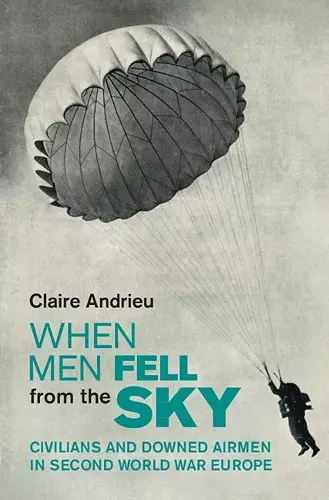When Men Fell from the Sky
Civilians and Downed Airmen in Second World War Europe
Format:Hardback
Publisher:Cambridge University Press
Published:13th Apr '23
Should be back in stock very soon

A fascinating comparative history of the treatment of fallen airmen in Second World War Europe.
A comparative history of the treatment of fallen airmen by civilians in France, Germany and Britain during the Second World War. By considering why the treatment of these airmen contrasted so strongly in these countries, Claire Andrieu sheds new light on how civilians reacted when confronted with the war 'at home'Between 1940 and 1945, more than 100,000 airmen were shot down over Europe, a few thousand of whom survived and avoided being arrested. When Men Fell from the Sky is a comparative history of the treatment of these airmen by civilians in France, Germany and Britain. By studying the situation on the ground, Claire Andrieu shows how these encounters reshaped societies at a local level. She reveals how the fall of France in 1940 may have concealed an insurrection nipped in the bud, that the 'People's War' in Britain was not merely a myth, and that in Germany, the 'racial community of the people' had in fact become a social reality with Allied airmen increasingly subjected to lynching from 1943 onwards. By considering why the treatment of these airmen contrasted so strongly in these countries, Andrieu sheds new light on how civilians reacted when confronted with the war 'at home'.
'This masterful book challenges us to rethink our assumptions about civilian action in France, Germany and Britain during the Second World War. Andrieu mobilises rich sources to craft a penetrating and innovative analysis. Burgeoning with fascinating detail, the book is an inspirational must-read for all those interested in the period.' Hanna Diamond, author of Fleeing Hitler: France 1940
'A comparison of the treatment of fallen airmen in Britain, France, and Germany during the Second World War, this prodigiously researched study is a micro-social history of the air war from below, viewing civilians as active participants rather than as victims. It also presents a bold argument about the macro-political and cultural reasons for the different national responses in this 'civilians' war.' All in all, a provocative, and compelling account.' Carol Gluck, Columbia University
'Claire Andrieu's magisterial book examines how local civilian populations in the Second World War reacted to the unexpected presence amongst them of pilots who had been shot down: Luftwaffe pilots shot down in France in May-June 1940; RAF pilots in Germany; Luftwaffe pilots in Britain; RAF pilots in Occupied France. Using an impressive range of sources, her book, taking us into the fields and cities of three countries, tells many poignant and moving stories. Written with exemplary clarity, it offers insights into the forms of civilian participation in the war effort; into the relations between the Resistance and the wider population in France; and into the respective political cultures of the three societies. This is comparative history at its best.' Julian Jackson, author of A Certain Idea of France
'In answering one of the last unsolved questions of World War 2 - how were downed Allied and German airmen treated when they parachuted into territory controlled by the enemy? - Claire Andrieu has drawn on massive archival research in four countries to give us a magisterial, closely-argued - and moving - work of comparative history.' Andrew Knapp, author of Charles de Gaulle
'How do civilians treat downed aviators in wartime? National political culture makes all the difference, argues Claire Andrieu in this pioneering, well-researched, and inspiring book.' Philip Nord, author of After the Deportation: Memory Battles in Postwar France
'Claire Andrieu reverses the normal scenario of bombing wars and focusses on those moments after airmen crashed to earth and found themselves isolated and facing angry civilians. In this powerful, probing and engaged analysis, she shows how fundamental the contrasting ideologies of wartime France, Britain and Germany were to what happened next. Vivid and compelling, this is history-writing that puts the politics back into the face-to-face encounters between civilians and airmen, making us ask again who were victims and who were perpetrators.' Nicholas Stargardt, author of The German War: A Nation under Arms, 1939–45
ISBN: 9781009266680
Dimensions: 238mm x 161mm x 25mm
Weight: 660g
348 pages